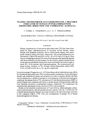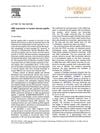 30 citations,
June 2015 in “British Journal of Dermatology”
30 citations,
June 2015 in “British Journal of Dermatology” Acne is common in women, often hormone-related, negatively affects quality of life, and requires various treatments.
 13 citations,
October 2002 in “Journal of Biochemical and Biophysical Methods”
13 citations,
October 2002 in “Journal of Biochemical and Biophysical Methods” Men with male-pattern baldness have higher levels of certain testosterone metabolites and may have more active androgen metabolism.
 12 citations,
April 1995 in “Journal of Medicinal Chemistry”
12 citations,
April 1995 in “Journal of Medicinal Chemistry” The new compounds moderately block a specific enzyme and strongly counteract a male hormone, suggesting potential for treating certain male-related health conditions.
[object Object]  11 citations,
December 2020 in “Notulae botanicae Horti Agrobotanici Cluj-Napoca”
11 citations,
December 2020 in “Notulae botanicae Horti Agrobotanici Cluj-Napoca” Mycorrhizal fungi and shading improve tea plant growth and nutrient uptake by changing hormone levels and gene expression.
 11 citations,
February 2003 in “Baillière's best practice & research. Clinical obstetrics & gynaecology/Baillière's best practice and research in clinical obstetrics and gynaecology”
11 citations,
February 2003 in “Baillière's best practice & research. Clinical obstetrics & gynaecology/Baillière's best practice and research in clinical obstetrics and gynaecology” Acne and increased body hair in teenage girls are normal but severe cases may need hormone evaluation and treatment can prevent diabetes linked to PCO.
 6 citations,
November 1980 in “Clinical Endocrinology”
6 citations,
November 1980 in “Clinical Endocrinology” Measuring plasma testosterone glucosiduronate is a reliable way to detect high male hormone levels in women.
[object Object]  5 citations,
January 2014 in “Postepy Dermatologii I Alergologii”
5 citations,
January 2014 in “Postepy Dermatologii I Alergologii” Hormonal treatments like birth control pills can improve acne in women with excess hair growth and hormone imbalances.
 3 citations,
December 2018 in “Meta Gene”
3 citations,
December 2018 in “Meta Gene” Certain gene variations increase male hair loss risk, influenced by hormone levels.
 3 citations,
July 1993 in “Contraception”
3 citations,
July 1993 in “Contraception” Women with moderate body hair have higher levels of certain hormones and may benefit from treatment that increases sex hormone-binding protein.
 2 citations,
April 2019 in “Медицинский совет”
2 citations,
April 2019 in “Медицинский совет” Combined oral contraceptives improve skin, hormone levels, and quality of life in women with PCOS.
 2 citations,
January 2014 in “International Journal of Endocrinology”
2 citations,
January 2014 in “International Journal of Endocrinology” Women with a certain type of tumor had higher levels of pregnancy hormone and male hormones, which decreased after treatment.
 1 citations,
February 2018 in “InTech eBooks”
1 citations,
February 2018 in “InTech eBooks” PCOS in lean women is a serious health condition with implications beyond fertility, affecting metabolism and increasing cardiovascular disease risk.
 September 2022 in “Curēus”
September 2022 in “Curēus” The removed ovarian tumor was a rare type of blood vessel tumor that improved the patient's symptoms and hormone levels after surgery.
 January 2020 in “International journal of current research and review”
January 2020 in “International journal of current research and review” Exposure to plastics may increase the risk of irregular menstrual cycles and symptoms of hormone imbalance in teenage girls.
 September 2014 in “Springer eBooks”
September 2014 in “Springer eBooks” Men and women experience skin aging differently due to changes in sex hormone levels with age.
 118 citations,
September 2004 in “Clinics in Dermatology”
118 citations,
September 2004 in “Clinics in Dermatology” Hormones, especially androgens, play a big role in acne, but most acne sufferers don't have a hormone disorder. Hormonal treatments, including birth control pills, can be very effective for women whose acne doesn't improve with regular treatments.
 46 citations,
May 2009 in “Maturitas”
46 citations,
May 2009 in “Maturitas” Taking DHEA for a year is generally safe for postmenopausal women but may cause acne and more facial hair without improving metabolism or aging.
 38 citations,
January 1997 in “Gynecological Endocrinology”
38 citations,
January 1997 in “Gynecological Endocrinology” Finasteride and flutamide effectively reduce hirsutism in PCOS women, with flutamide also lowering hormone levels.
 35 citations,
November 1931 in “Journal of Genetics”
35 citations,
November 1931 in “Journal of Genetics” Hairless mice lack fur due to a genetic mutation affecting skin response, not hormone issues.
 33 citations,
September 2008 in “Dermatologic therapy”
33 citations,
September 2008 in “Dermatologic therapy” Doctors should know how to diagnose and treat PCOS, which often involves checking for high male hormone levels and using medications to manage symptoms.
 31 citations,
March 2015 in “The Journal of Steroid Biochemistry and Molecular Biology”
31 citations,
March 2015 in “The Journal of Steroid Biochemistry and Molecular Biology” Neuroactive steroids could become safe, effective treatments with more understanding of their complex brain actions and metabolism.
 31 citations,
September 2006 in “International journal of gynaecology and obstetrics”
31 citations,
September 2006 in “International journal of gynaecology and obstetrics” New treatments for PCOS focus on insulin resistance and reducing testosterone levels, along with traditional hormone therapies.
 21 citations,
January 2020 in “General and Comparative Endocrinology”
21 citations,
January 2020 in “General and Comparative Endocrinology” Lack or blocking of SRD5a, a key component in hormone creation, can lead to conditions like pseudohermaphrodism and affect hair growth, bone mass, muscle strength, and reproductive health. More research is needed on its regulation from fertilization to adulthood.
 20 citations,
August 1987 in “Journal of steroid biochemistry/Journal of Steroid Biochemistry”
20 citations,
August 1987 in “Journal of steroid biochemistry/Journal of Steroid Biochemistry” Aldactone was more effective in reducing hair growth in women with hirsutism than Diane, despite having less impact on hormone levels.
 17 citations,
May 2012 in “Clinical Endocrinology”
17 citations,
May 2012 in “Clinical Endocrinology” Surgery to lower high testosterone in postmenopausal women with certain ovarian tumors doesn't significantly affect their metabolism.
 14 citations,
August 2014 in “Applied Physiology, Nutrition, and Metabolism”
14 citations,
August 2014 in “Applied Physiology, Nutrition, and Metabolism” A low-starch/low-dairy diet may help overweight women with PCOS lose weight and improve metabolism, but more research is needed.
 11 citations,
February 2016 in “Current Medicinal Chemistry”
11 citations,
February 2016 in “Current Medicinal Chemistry” New treatments for prostate cancer and BPH show promise, including novel compounds that target hormone synthesis and response.
 10 citations,
January 2019 in “Journal of Chromatography B”
10 citations,
January 2019 in “Journal of Chromatography B” Researchers developed a reliable way to measure hormones in urine, showing that a baldness treatment doesn't change hormone levels.
 9 citations,
March 2020 in “Gene”
9 citations,
March 2020 in “Gene” Certain gene variants in estrogen receptors are linked to polycystic ovary syndrome, mainly affecting metabolism, in Tunisian women.
 7 citations,
July 2005 in “Journal of Dermatological Science”
7 citations,
July 2005 in “Journal of Dermatological Science” The gene URB is more active in human hair growth cells and responds to a hair-related hormone.






























